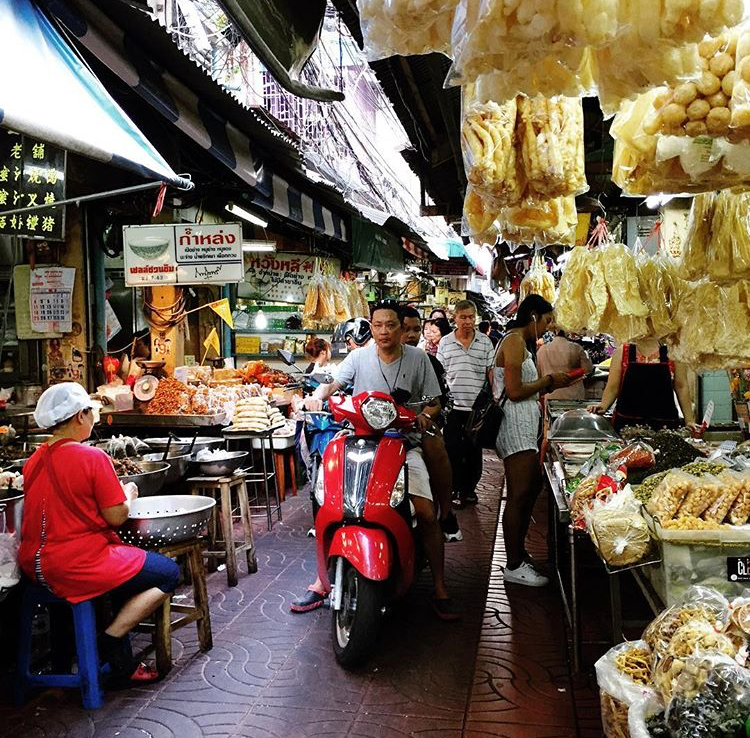Surprised by Bangkok
Bangkok.
What image pops in your head? The traffic, the lights, the chaos, the nightlife? The less-than-kosher tourism activities for which the city is notorious?
For me, the image was pretty much a replay of The Hangover. And, in case it’s not clear, I don't mean that in a good way. Most people to whom I spoke about Thailand suggested skipping Bangkok altogether and heading straight to the islands or northern mountains.
But in summer of 2016, when the most perfect volunteer opportunity sprung up and would have me stationed in Thailand’s capital for a month, I decided to go for it. At least I knew I liked Thai food.
I landed in the city late at night…
…following a month of backpacking through Africa, the Middle East, and South Asia, a daunting solo trek through the Himalayas, a bout of debilitating altitude sickness, and being greeted upon my return to Nepali civilization with a long-distance FaceTime breakup. To make matters worse, as I stepped off my plane in Bangkok, I was struck by how little information I had moving forward: I didn’t know how to get to my Thai host family or what in the world I’d be doing when I showed up to work the next day.
All in all, I was emotionally and physically drained, and not altogether thrilled about life as I stood in the sterile and brightly lit Bankok airport. No one spoke English. My Thai was about as good as my skills as an electrician. And would I even be able to find a place to sleep that night?
It was a blur, but somehow I managed to get myself a Thai cell phone number, a taxi, and a better attitude before showing up at the little house on “On Nut” street where I’d be living for the next month. If I lasted that long.
I was greeted with a slew of delicate little wais (the typical Thai greeting, which consists of placing your hands together in a prayer-like position and bowing) and hellos (“sawadee khrup/ka!”), something spicy and delicious and mysterious on a plate, and the warmth of a family that I hadn’t felt in far too long. And then I slept.
I ate about six meals a day while in Bangkok. From roasted duck to barbequed fish to strange meats and desserts the ingredients of which I'll never know, and all at about 70 cents, it’s a food-lover’s paradise. If possible, befriend locals and have them lead you to the best street food.
Life In Bangkok as a “local,” not a tourist.
Most of my time over the next month was spent volunteering for The Well, an organization that works with women who have been affected by the Thai sex trade. My work involved sewing projects, jewelry-making lessons, pie-baking classes, some creative projects to spruce up the buildings a bit, and lots of raw, challenging, grace-filled conversations.
It also involved stepping into a close-knit community of Thai women who were eager to welcome me, ask a million questions, commiserate in relationship woes, disclose their life stories and hear my own, and compliment my curly hair and prominent nose (and tell me how crazy I am for wanting to get a tan at the beach . . . not all standards of beauty are universal).
It involved more shared meals of strange meats and spicy vegetables that I can count, spa outings, pool parties, shopping excursions, and laughter and tears and friendships that I never expected. I made instant friends who taught me how to navigate the city, what to order off the street stalls, and a pretty respectable base knowledge of the Thai language (which, to be fair, was at least 60% related to food). I also quickly built a pretty solid support group despite the language barrier because, well, I cried a lot and had no one else to go to, and unlike the appeal of tan skin, love and friendship and basic human emotion actually are universal.
I’d come home from work every day to my Thai host family who spent their dinners patiently translating conversations back-and-forth on Google Translate, helped me celebrate my 25th birthday, and comforted me when that strange American girl would unexpectedly break into tears over breakfast because, as I've said before, real, hard life continues even on the other side of the world.
A major project during my time in Bangkok was working with the women of The Well to create a line of stunning, one-of-a-kind Thai silk clutch purses and earrings. Contact me if you are interested in purchasing one of these beautiful pieces. Online shop coming soon.
I saw a Bangkok that most people don’t get to see.
I saw the red light district and the substance abuse for which the city is notorious, but I saw it from the perspective of the heroes – those who were fighting to restore their communities and families and provide safety, healing, and opportunity to the vulnerable.
I saw the traffic and the lights and the chaos, but I saw it through the lens of a strong-willed, confident teenage girl named Dear who spoke little English but led me through the streets and on public transportation with finesse and plenty of giggles.
I saw the food – boy, did I see the food – but I also learned how to cook it, made friends with the owners of neighborhood food stalls, shared homemade meals with my Thai family every night, exchanged Thai/American recipes with my new friends, and tasted dishes that, without my Thai support group, I would have never known existed (let alone how on earth to actually order them).
I’m not sure why Bangkok gets such a bad rap. Maybe it’s the way it’s portrayed in media or Hollywood, or the stories of debauchery that many people bring home from their wild Thai vacations, or the fact that it is indeed quite chaotic. But for whatever reason, it’s not at the top of most people’s bucket lists. It definitely wasn’t at the top of mine, either.
But by the end of my month of meeting the local people, shopping in the malls, touring the temples, eating the food, and conquering the tuk tuk system, I was just about ready to tear up my passport and stay there forever. (I actually did end up accidentally overstaying my visa, which I’ll take as a testament to my affections for the city, and not poor planning.)
My positive perception of Bangkok is largely attributed to the fact that I built relationships with locals by working in the community and staying with a host family. In a city with a notorious tourism culture, it seemed the only way for me to see the real Bangkok was to intentionally plug in behind the scenes: live in its neighborhoods, eat anything and everything from its food stalls, work alongside its people, learn its language, and get a gym membership to fight off all that white rice.
In sum, sometimes the best way to face the thing that scares you is to press into it, to seek to understand it more fully, until you become a part of it. And maybe it even becomes a part of you, too.




